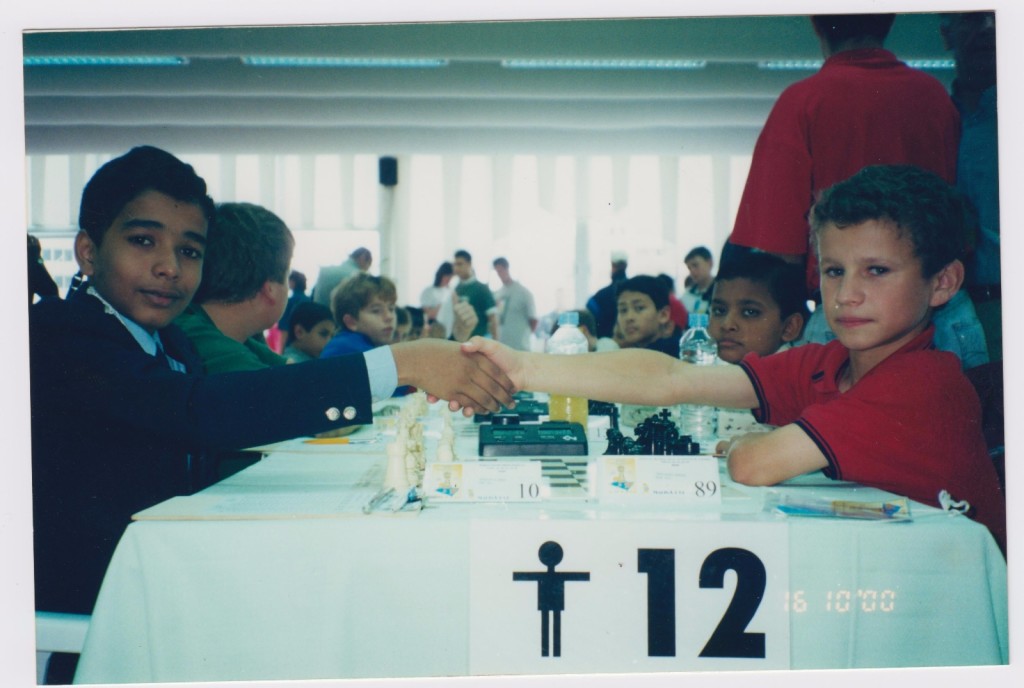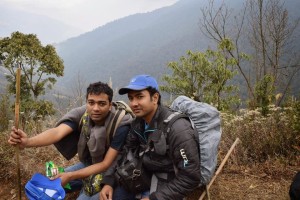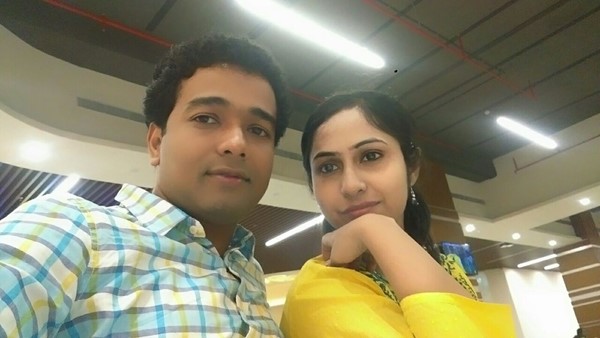GM Deep Sengupta has been one of the most prominent players in India. In this in-depth interview Deep talks about his recent victory in Hastings, his early career, what’ll it take to get top players to play more in India and more! Scroll down!
Srinath Narayanan: How does it feel to win a tournament with such a rich heritage?
Deep Sengupta: I am really happy to win Hastings Masters for the second time (Editor: First time was in 2010-11). Just like the previous time I started with 1/2. It seems like Hastings is a lucky place for me. It was wonderful to see my name inscribed on the Golombek trophy with several ex-world champions.

You had an unexpected defeat in round two against Bobby Cheng. What went through your mind at this moment?
To be honest there was nothing in my mind after the unexpected defeat. This time I was mentally prepared to play for fun and not bother about results.
What was your goal before the tournament?
I wasn’t really playing for any specific performance. For a change, I was simply playing for fun!
Can you tell us something about your schedule during Hastings—how many hours did you prepare and rest?
I mostly had leisure time. Chess preparation would begin after the breakfast and would go on for about 2-3 hours. In the afternoon I would have a walk before the lunch. The rounds were in the afternoon with a six-hours schedule. Hence, there would not be much to do after the games finished. My roommate was my very good friend Arghyadip Das. We walked through the town center, went to the Hastings pier. The weather for a change was excellent in Hastings this year, and we could actually venture out of the room!

Let’s go back in time and talk a bit about your childhood. How did you take up chess?
I learned chess at about 5 years of age. My father and uncle used to play the Indian version at home (where the king could move like a knight until checked). Seeing my interest in it, I was taught the basics. I picked it up quite fast. Soon I won the Nationals in 1995 in U-7.
However, the major stepping stone was the World U-12 Gold medal. Until then I was confused between academics or sports as a career.
Tell us something about the coaches that influenced the early part of your life, about your mentors.
I grew up in Chakradharpur, a small town of Bihar (now Jharkhand). In the early 90’s there was not even the most basic infrastructure in place. However, there was a local chess club where enthusiastic people played chess. I saw a few local tournaments when I went with my father to watch these tournaments. I suggested a few moves once in a while. It is from here that one of the club members realized my potential and I was assigned Mr.Amit Medda, a young player of about 15 years from the association. Hence the basics of chess were taught to me by him. He kept helping me for quite some time even in the later stages. After I played the first National U-8 championship in 1992 in Palghat (I think), my parents realized that there is much much more to learn in chess. Soon they started to look for some trainer who had competitive experience. I was then taught by Sri R.C.Chatterjee (International Arbiter) who taught me the first opening of my chess career – The french defense! I used to visit his home near Howrah for 5-6 days in a month. As I improved further I trained with Mr. Shantanu Lahiri (elder brother of IM Atanu Lahiri). But coming to Kolkata every month and staying for several days was quite difficult. The cost was quite expensive (in those days the word “sponsorship” was not known to people from small villages and towns). This continued for some time until it became impossible to continue further. It was important to get guidance from someone. Then, IM Neeraj Kumar Mishra took me under his tutelage for several months. Being aware of my background he taught me chess in the weekends without any fee! He himself was busy with tournaments. Therefore not much time was available. Somewhere around then I won the World U-12. This opened some new avenues for me like I got selected to attend a few GM training camps (by IM Lysenko and late GM Sorokin -RIP) organized by AICF. Some financial support to participate in open tournaments came from Tata steel and the local traders association. These tournaments had a hefty entry fee of Rs.25000/-. In my youth days, my last trainer was Mr. Varugeese Koshy. I learned a very different aspect of chess from him (the endgame!) which otherwise I had no idea. I became an IM in 2004. Once I moved to Kolkata in 2006 I got acquainted with GM S.S.Ganguly. He has been my mentor since then. He helped me a lot to complete the GM title.
That’s interesting. Aside from the coaches, can you tell us something about the role played by your family members in your career?
The support from my family members has been overwhelming. They have undertaken extreme hardships to make me where I am today. It’s easy to imagine without any financial support how difficult it can be for someone living in the most backward area of the country. It wasn’t just my parents but also few of my relatives. My maternal uncle who works in National Library has accompanied me several times in the early days when it was not possible for either of my parents.

You won World Youth at quite an early age, at a time when it was not common for Indians to win medals in this competition. How did this happen and what was the impact of this in your career?
The first World Youth I played was in 1998. That was the first time I faced against international competition. I finished 15th. At that time my chess knowledge was extremely shallow compared to my foreign counterparts. The next big hurdle was the European food. I simply could not adjust. I lived entirely on french fries and some dessert. Hence the games towards the end turned to be of worse quality. Then in the year 2000, I had this gut feeling that winning is not an impossible feat. My only problem was food and some guidance for the matches. However, as events unfolded I lost my food card. I did not get entry to the restaurant. A lot of my friends went with their parents and coaches. They started inviting me alternatively and offered me Indian food. At least one issue was solved. I played some nice games and with some luck, I won the title after winning the last game against my Icelandic friend Kjartansson Gudumundur. This victory was probably the turning point in my chess career. My determination was much stronger to become a grandmaster. I also got some financial support to participate in the strong open tournaments.

It took a while for you to go from 2450 to a grandmaster. How did you cope with this and get past this?
This was probably the most difficult part for me to cope. I was struggling between 2450-2490 for a long time but was unable to complete. I have missed my last GM norm several times by a whisker. I am sure many others face this similar issue, wherein you need a draw in last round and under pressure, it becomes difficult to achieve. It’s more of a self-confidence issue and extremely frustrating. My last GM norm was completed in Cannes, France 2010. It was under similar circumstances as earlier. I was playing with the White pieces against GM Christian Bauer. I needed a draw as usual. But he played an unusual line. I was quite sure that I couldn’t force a draw out of the opening. My self-confidence was in such a state that I had almost given up the game even before it had even started! Then it was Surjo da (S.S.Ganguly) who sent me some of his “old notes” to counter the sidelines and said some really motivating stuff. I had absolutely no difficulty to get a clear advantage out of the opening. My opponent offered a draw when he was a pawn down and I accepted it looking back at my poor track record for the last GM norm.
Lately, there seems to be an influx of Indian players in European opens. Everyone seems to prefer tournaments abroad, why do you think this is the case?
My personal opinion is that the European tournaments offer better playing conditions compared to India. The number of entries are much lesser and you get a chance to face stronger opponents which is extremely important to make norms. The tournament venue is probably more conducive for chess competition with no traffic sounds all around unlike in India.
What can be done to get more Indian top players play in Indian Opens?
I think there should be a restriction on the number of entries or a rating cut off of 2350 or something for the Indian top players to consider playing here. I am sure many top players will participate.
What does a normal day of your training look like?
My training usually starts at about 10 am and continues till 5-6 pm with a small break in between for lunch.
What do you do to keep yourself physically fit?
I do yoga and pranayama daily. And sometimes when I am at home for a considerable period, I jog for about an hour.
Whom do you work with most often?
I am mostly working with my close friend and practice partner Arghyadip Das. We have been training together since 2008.

What do you do apart from chess?
I like spending time at home playing indoor games like bridge, carrom etc. I also like to play Badminton and Table tennis whenever an opportunity arises. I am also quite fascinated by my recent trekking experiences in the Himalayas and hope to do similar ones in the near future.

How do you relax during tournaments?
During tournaments, I go for short walks. If I am in Europe I like walking down the town center pedestrian zones. I also like to watch T.V Series especially my favorite genre called Wuxia.
What is the first thing that occurs in your mind when you look at a position? Do you immediately start calculating or have some general mechanism?
I usually make an assessment of the position first. Then the calculation phase begins.
How has your approach towards opening preparation changed over the years, with the exponential increase of information?
The approach has changed drastically. In the initial years I just followed what others were doing. Now I am trying to find my own ideas.
What do you think about the importance of the study of classics in the formation of a player? Is there any particular book/DVD you would recommend for this?
I think classics are of prime importance to make a solid base for chess education. My great predecessors (by Kasparov) is an extremely important book for studying classics.
2016 began with a little slump for you, what lessons did you learn from that and what did you do differently in the second half?
I think there are good and bad phases. My bad phase probably started with the National premier 2015 at Thiruvarur and the shock of losing almost 60 points in back to back tournaments continued for some time. Now I have mostly recovered that was lost 🙂
Why do you think most young Indian players stabilize at a certain point, and what in your opinion can be done to overcome this?
Young Indian players start extremely well in the age group tournaments but due to the limited training facility in India and very limited exposure to the international competition they tend to stagnate after a certain time. However, I think this is changing slowly and now we have some very talented youngsters doing extremely well.
Are there any particular insights/lessons from your career that you would like to share with youngsters/upcoming players?
It’s the same thing what I was told in my younger days but I didn’t understand – to work hard as time is very limited and competition is growing exponentially.
What is your current ambition/goal in Chess?
My current goal is to take my elo rating to 2650 as early as possible.
You’re set to get married very shortly 🙂 How does it feel?
Wedding in itself is a very big event in everyone’s life. I am hoping everything turns out to be as expected and nothing unusual happens, but I am prepared for all the new challenges.

Blitzkrieg!
What do you regard as your biggest strength?
Patience.
If you weren’t a chess player, what would you be?
Research scholar or a Chartered Accountant.
The changes you would like to see in Indian Chess?
Closed tournaments and Indian chess league.
Greatest fear?
Losing.
A historic chess player you would like to face-off over the board?
Fischer.
Early bird or night owl?
Midway.
Your most memorable game?
Against Edouard Romain in Hastings masters 2010-11.
Thanks for the interview and wish you a happy 2017!